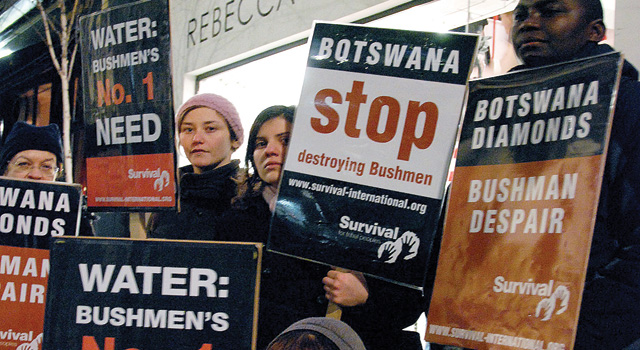TSAONE SEGAETSHO
The wildlife law enforcement in Botswana always end up harming Basarwa communities because those laws are being enforced by the wrong people against wrong people.
This was said by former Basarwa Lawyer Gordon Bennett when delivering a legal analysis of the negative impacts of wildlife law enforcement in Botswana, Cameroon and India to the International Union for the Conservation of Nature (IUCN) symposium in South Africa on Friday last week. The symposium was organized by the IUCN and others in order to raise awareness of the abuse of tribal peoples in the name of conservation
The human rights lawyer was banned from Botswana in 2013 after representing Basarwa in a case against government. According to the government Bennett is denied entry to Botswana “in the interest of national security.”
“In Botswana, the law allows those who are “principally dependent” on hunting and gathering to apply for special game licenses. Regulations explicitly refer to persons who can rightly lay claim to hunting rights in the Central Kalahari Game Reserve(CKGR),” said the human rights lawyer.
Bennett also said no “special game licenses” have been issued for the CKGR since 2002 and that in 2014 hunting has been banned almost everywhere in Botswana. He said the ban was renewed for another year only last month. The British human rights lawyer said it pays no heed at all to the rights or needs of the Bushmen of the CKGR.
“The Minister of Wildlife drew up and signed the ban at his desk, in the exercise of his statutory powers. He did not have to explain his decision to the National Assembly or anyone else. There were no consultations,” Bennett told the attendees.
Bennett also said the Minister acted entirely off his own bat, in the untested belief that “illegal off take” was or might be to blame for a decline in wildlife numbers.
“Responsibility for the enforcement of the hunting ban rests with a paramilitary force called the Special Support Group. Its members are heavily armed, in the CKGR and have camped close to Bushmen communities,” said Bennett.
Bennett also said the Bushmen have been made to feel that they are under constant surveillance. He said they report that they and their homes are searched at random, and that on occasion they have been beaten or threatened.
According to Bennett, the Bushmen no longer eat during the day to reduce the risk of detection, and have had to abandon hunt related customs.
Ahead of the IUCN symposium Bennett, a Bushman spokesperson Jumanda Gakelebone and SI campaigner Dr Jo Woodman also hosted a press conference in Johannesburg, South Africa to expose the persecution of tribal peoples in the name of “conservation.”
Meanwhile the number of people around the world joining the boycott of Botswana tourism campaign is on the increase.
At the time of going for print, the number of people who sent Minister of Tourism Tshekedi Khama emails through Survival International (SI) website was 9107.
Survival International Spokesperson said in an interview with The Botswana Gazette that over 9000 people have joined their boycott of tourism to Botswana. However the Spokesperson would not give the exact breakdown of the countries of people who have signed the boycott.
“I can’t give you an exact breakdown of the countries of the people who have signed our boycott, but they will be from around the world,” said the SI Spokesperson.
International tour operators like Travelpickr are one of the companies who joined Survival’s boycott and said, “We have canceled our pending [tour] requests for Botswana and informed the local tour operators about this boycott. We will suspend all tours and block tour requests to Botswana until the government in Botswana has improved the situation.”
A Spanish tour company Horizonete Paralelo also stated, “We have joined Survival’s boycott of tourism to Botswana. We think it’s the appropriate measure in the face of the victimization of Bushmen. We are deeply troubled to read Survival’s letter and learn about the degrading treatment of the Bushmen at the hands of the government.”
The Spokesperson said Survival International has recorded over 200 cases of violent abuse of the Bushmen in Botswana at the hands of wildlife officers and police.
When asked how much has the boycott Botswana tourism campaign affected this country’s economy and whether government is doing something in response to the campaign the Ministry of Environment, Wildlife and Tourism could not respond to our questions before going to print.

